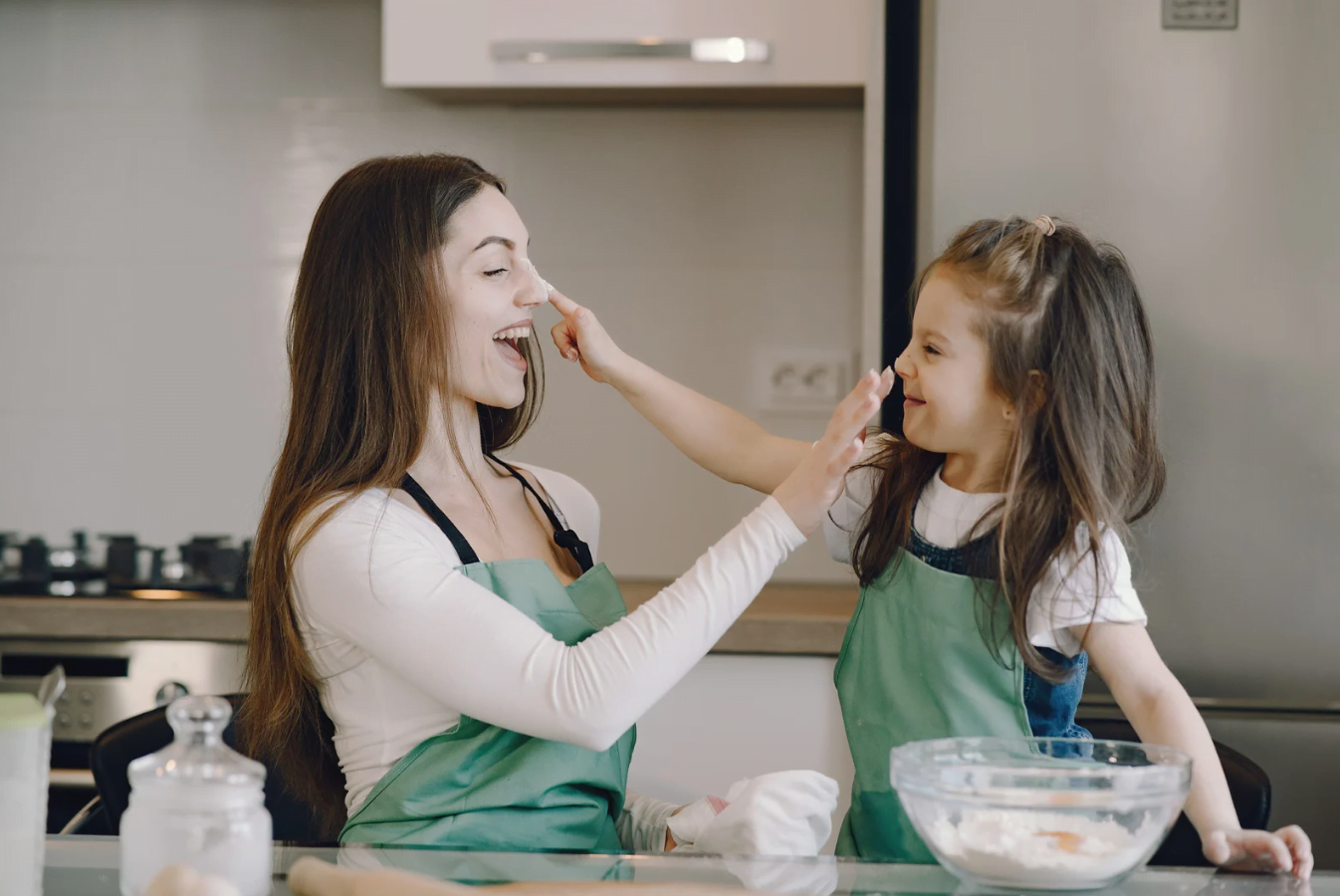How to Be a Good Mother, From One Mom to Another

Becoming a mother is one of the most pivotal experiences in a woman's life, but it can also be one of the most difficult. No mother I know has ever said that motherhood was all fun all the time although different mothers experience varying levels of challenge.
In this article Dr Caprice Deaton shares her thoughts on what makes a good parent and how you can nurture yourself and family throughout the course of motherhood.
Here are her top tips on how to be a good mother
- Embrace imperfection in motherhood and learn from your mistakes.
- Reject the idea of a "perfect mother"; it's an unrealistic standard.
- Set long-term parenting goals to guide your current actions.
- Forge strong bonds with your children for positive developmental impacts.
- Prioritize quality time and individual attention for each child.
- Focus on and praise your child's positive behaviours.
- Understand child development stages for appropriate expectations and responses.
- Adopt gentle parenting techniques, emphasising patience, empathy, and respect.
- Prioritise self-care to maintain personal well-being and set a positive example.
- Accept that motherhood is challenging yet rewarding, and continuous learning and adaptation are key.
If you're reading this you're already halfway there...
If you have children, you can assume that you are in for it - the highest of highs and the lowest of lows - a little like a roller coaster. It's a tough job, but rewarding which makes sense really; usually the things we are most proud of don't come easily.
Anybody can be a mother; there is no guided study or test prior to childbirth or adoption. So, it’s no surprise so many of us end up wondering if we are doing the right thing when it comes to our children.
Are you a great mom, good mom, not so good mom, or maybe even a bad mom? And if you are not so good or even bad, how can you improve? This blog hits some key topics that will help you to become a better mom, however, the fact that you are reading this is already a sign that you are leaning towards good – so well done!
There is no perfect mom

You probably know her from your neighbourhood or local primary. She's always bright and cheerful; has a brilliant career; a couple of immaculately dressed, clean and polite children. She's able to produce an endless supply of delicious fairy cakes and volunteers for every school activity. She appears to be effortlessly perfect.
Appearing that perfect though actually takes a lot of effort and anyway there is no such thing as a perfect mother. In fact, we all need to accept that we are and have been imperfect mothers and are likely to continue making mistakes.
It is impossible to be a kind, loving, supportive, patient mother 24/7. You are going to get stressed at times and lose it. You may even shout and say things you feel guilty about later.
Brené Brown in her book Daring Greatly suggests that perfection is exactly what we should not expect and that we need to learn to accept ourselves as a work in progress. If we can accept our imperfections, then it becomes okay to show vulnerability, to own our mistakes, to apologise as needed and to continue to learn and grow as a parent and someone who strives to be a good mom. You don't give up; you just stop beating yourself up over not being perfect and contemplate what you can do better next time.
Think about it, if we all stop trying to look perfect to the outside world, then "perfect mom" ceases to exist and the pressure is off you, me and all the other moms too. We can all be human.
Begin with the end in mind

When you think about how to be a good mother, it's helpful to begin with the end in mind. This means projecting yourself 20 or 30 years into the future and thinking what you want to achieve so that you can be sure that what you are doing now will help you to reach those goals. This is strait out of the world famous book by Stephen Covey, the Seven Habits of Highly Effective Families - a book that I used a lot when my kids were growing up.
You can do this by asking yourself three important questions. What do you want your kids to be like as adults? What kind of relationship do you want with them? How do you want them to evaluate you as a parent?
I would assume you want them to be happy, responsible, independent, kind, and well adjusted. But whatever you want, you need to ask yourself regularly how your parenting will support that development. If you want positive relationships with them as adults and you want them to have good things to say about you, again think and act carefully because someday you will be answering for both how they turn out as adults and the relationship you have with them going forward.
Although some of how they turn out is genetically based, some of it is how you raise them. Decades from now they may say "Mum you know you should have done this or you should have that..." or maybe they won't be talking to you much at all. Or they might say "You know, you were a fab mum! Thanks for so much everything!" You don't have total control over that, but some.
Bond with your kids

As the mother of your child, you are likely to be the first person on earth that he meets. Assuming you are one of the primary care givers, you are also likely to be one of the most influential in your kid's life even after that child leaves home. The lessons learned in childhood from you will be remembered, consciously or unconsciously, and will be carried on throughout life. So being a good mom is important.
Recent research suggests that kids need to form a close bond with at least one adult at an early age - typically it's the mother. If it is a strong and positive bond it will have a more positive influence as the child grows into the teenage years and adulthood. If it is not a strong bond or is more negative in nature, a variety of problems may ensue.
Connection parenting

In her book, Connection Parenting, family therapist, Pam Leo describes what it takes to develop a close bond or connection with your child. It involves regularly taking time to relax and be with your kid and to give her your undivided attention. While family time spent all together is important, you also need to spend quality one on one time with each of your kids.
Many parents think that helping kids with their homework, doing household chores together or simply being present at school activities counts for quality time. These things are wonderful, show you aim to be a good mother, and if that's all you can fit in, okay. But what's better is to spend time that specifically demonstrates your kid's individual importance.
Activities that facilitate more individual connection include just the two of you doing things like going to lunch, taking a walk, working on a hobby, or going camping (even if it's just on the floor of your kid's room).
Finding time for such things may sound like a luxury you don't have time for especially if you work full time and/or have multiple kids or other demands. While spending a few hours per week with your kids individually might be impossible, if you can't, don't worry, research suggests quality is more important and there are still other less time-consuming ways to connect with kids.
The National Association for the Education of Young Children suggests aiming to connect with kids face to face in some way every day. This might be done at different times depending on your schedule: a quiet chat during the school run, an after-school snack together, or reading a story at bedtime. If your schedule allows it, you might want to establish a daily connection ritual - this could be any of the things just mentioned or something different. It's up to you.
On the occasions when you can't connect with your kid face to face, consider leaving a note in her lunch box or on the bathroom mirror to let her know you are thinking about her. Face time and texting work too.
While spending quality time with your kid and connecting on a regular basis is perhaps most important, there are other ways to foster a connection and positive relationship with your kid like the following:
Catch your kid doing something right
Instead of noticing mismatched clothes, unwashed hands, or disheveled hair, tell your kid how happy you are that he came inside when he was called, how he said please or thank you, or how great it was that he put away his toys without being asked.
Involve your kid in cooking and cleaning up
Not only can this give you more quality time together, but kids can begin to learn about meal preparation early - a life skill they will need later.
Eat meals with your kid whenever possible
Mealtimes are a great time to relax and catch up about what is planned for the day or what happened during the day.
Walk the dog together
Dog walks can be a fun bonding activity during which you can also set an example for how to be a good pet owner and look after your own physical well-being - part of being a good role model for your kids.
Put your mobile phone away not just down
It's hard, but if you're on your phone you can't be paying proper attention to your child.
Some interesting recent research shows that simply having your mobile phone on the table at mealtime is distracting and negatively influences interactions even if you don't touch it.
Learn about child development

No matter how much you think you know about parenting, the old adage is true, the more you know, the more you know you don't know. It is very important to learn about how kids develop so that you know what to expect from your child at different ages - and they are changing all the time.
For instance, can a toddler be expected to sit quietly at the dinner table for an hour? The answer is no. But some moms may unknowingly think it is okay to expect that and then punish their toddler when she won't sit still. Kids have different developmental needs at different ages and it's important to become familiar with those needs so that you respond to them and don't punish your kids inappropriately.
Today there is so much information available about child development there is no reason why you can't get your questions answered. But the problem is now sorting through the vast quantities of advice to figure out what is accurate and that is where you must take care.
Choose sources of information carefully

Anyone can publish online and make themselves seem like an expert. There are fringe scientists publishing studies based on poor quality research. Such material gets passed around on parenting forums and suddenly a myth has been created in place of verified scientific facts.
The amount of erroneous and sometimes dangerous information online is worrying (see the debunked autism - vaccination association as an example) and some unsuspecting moms read it and take it to heart which is a real concern.
It is important to critically evaluate your sources in order to protect your kids and yourself. This applies to published articles and books which you may have read yourself or that you have heard about through others. If you have heard about a study or book, you really need to read it yourself to see if it can be trusted. Don't just trust what someone else tells you.
There is an abundance of material available on websites, but the National Health Service and government agencies are typically sources that are less biased and more reliable. Books can also be great sources, especially those from respected publishers with good reviews.
One final suggestion here is that if you have a particular parenting issue that concerns you, consult multiple sources rather than just one to get a balanced and hopefully accurate perspective.
Be choosy about parenting forums

Online forums can provide a valuable source of support for new moms but they can also be sources of incorrect information and can create anxiety in new moms.
While some information can be downright false and dangerous, other discussions can create unnecessary worry. Cloth nappies v. disposable; homemade food v. pouches; breast v. bottle feeding; going back to work v. being a stay home mom - these are all choices - but some mothers feel strongly one way or another and will make other mothers feel guilty about their choices.
Discipline and dealing with problem behaviours

Good moms know that addressing discipline and difficult behaviour is a key topic because it's often an area where mothers struggle and things go wrong. Discipline has changed over the years.
Spanking children, once common, is now rare and discouraged by the vast majority of child development experts and doctors. Similarly shouting or just telling your child "Do it because I said so" is useless. There are various reasons for this but one good one is that we close off conversation and miss opportunities to teach kids how and why decisions are made.
Therapists often find that when mothers come in for help to resolve their child's behaviour problems, they are looking for answers in the wrong place. As described by parenting expert, Pam Leo, if our plants aren't thriving, we assume it's problems with sunlight, watering or soil conditions. But, kids? If they aren't thriving, the we blame it on them! But just like plants, kids need good growing conditions to thrive. So, whatever the behaviour problem is, be sure to look at yourself and the environment first – don’t automatically assume it’s about your child.
Gentle Discipline

Gentle parenting is an approach to raising children using patience, empathy, and respect. It emphasizes being aware of what your child is capable of doing at different ages as discussed above. Because research shows that parents tend to expect kids to do things that they can't yet do AND when they can't do those things kids are usually punished. Punishment can actually exacerbate disciplinary problems so gentle parenting can be helpful to avoid disciplinary problems.
Traditional parenting approaches tend to focus on reward and punishment as the main approach for teaching kids - that is, kids show good behaviour and get treats (e.g., candy, toys); or kids show bad behaviour and get in trouble (e.g., spanked, yelled at). Reward and punishment is far less central in gentle parenting which focuses on helping kids develop self-awareness and understanding of how their behaviour impacts others. It also increases the chances that they will make better choices in future. As one paediatrician, Dr. Karen Estrella puts it “the idea is to be more like a coach for your kid rather than a punisher.”
Gentle parenting involves making use of the following techniques:
Patience
The ability to gracefully accept delay, trouble, or suffering without losing it. Kids can certainly test your patience in a myriad of ways. Rather than reacting impulsively to the challenges they present, patience allows you to take a step back and respond carefully and thoughtfully.
Empathy
Empathy is the ability to set aside your own reactions and view a situation from the perspective of your child. Essentially, you put yourself in your child's shoes.
Respect
If you want your child to be respectful of you, it's important to be respectful of her. That means listening to what your child has to say even if you are too busy and don't have time to listen or you don't agree. By listening you help her to build self-esteem and confidence. When she protests, give her your ear, at least initially. Then if you still don't agree, gently explain why it can't go her way.
To put these guidelines into practice, kids often have a hard time with play dates coming to a close. You may at times end up in a shouting match when your kid simply refuses to leave. To avoid this, gentle parenting suggests discussing expectations ahead of time so that it's clear the activity is time limited. Then when you say it's over, as your child protests, get down on their level, make eye contact and listen to them (patience). Then calmly but kindly acknowledge your child's feelings of distress (empathy) and say there will be other times to play and explain why it's time to leave (respect). This could include explaining, for instance, that your partner has to be collected (empathy for others). Then outline what will happen next (e.g., walking home, getting cleaned up).
Sounds simple enough and for some it is. But for others, it's not. Some find their kids do not respond well to gentle parenting or that it doesn't work for serious behaviours like aggression. Indeed, gentle parenting should not be seen as the be all end all. It's a set of techniques that can be useful for avoiding the behaviour problems which can result from poorly executed discipline. It's not parenting doctrine.
Some kids require different techniques - not shouting, spanking, or other harsh punishment but alternatives like planned ignoring, using consequences, or time outs. There are other ways to address discipline problems - and these are some ideas to get you started. If you are having significant problems and have exhausted reading resources, consider joining a parenting group or seeing a professional for help.
Maintaining a Sense of Humour

"A person without a sense of humour is like a wagon without springs. It's jolted by every pebble in the road." Henry Ward Beecher
Humor has long been known as a great way to relieve stress, express difficult feelings, and deal with trying circumstances. Humour can help to facilitate connection and communication with our kids and everyone else too. It's good for your overall health and well-being and it's been shown to improve academic success in children.
One of the most important characteristics of a good mother is the use of humor. You might say that you are not naturally funny; well, you don't have to be. You can find simple ways to use humor that can lighten your life and that of your kids.
There is the more obvious material you can share with your kids like looking up and sharing new jokes at dinner time, or watching comedy films together, sharing funny podcasts or memes, or playing funny board games. Even a "see ya later alligator" when you drop your kid at school can lighten the mood.
When my kids were young, a life-sized Dr Evil cardboard cutout made his way into our house. He figured into a wide variety of jokes - surprising all of us at one time or another when he would show up unexpectedly in our closets, occasionally appear as a sentinel in the front window of the house, and would sometimes, and still to this day, figure in family photos. One year he even went skiing with us. He was the best £20 I ever spent.
Finally, let's not forget the ability to laugh at yourself. If you trip and fall or otherwise do something silly, the best thing you can do in front of your kids is laugh and make of joke of it. It shows that you don't take yourself too seriously. That's being a good role model and a good mother. Don't stop here though, consult some other sources for ways to lighten family life.
Fostering Independence

I had a neighbour once who had two daughters in their 50’s, never married, no kids, still living in a small 3-bedroom semi with their mom and dad. It's hard to know exactly what happened there but one can safely say that for some reason they never established independence.
Sometimes adult children with independence problems manage to move out but remain overly reliant on parents to help them make decisions and manage their lives. Failure to become independent can happen for many reasons. For instance, sometimes mothers can be overly involved in their children's lives and the result can be that kids never learn to trust themselves or feel confident running their own lives. There are many ways to encourage independence in kids; here are a few.
Let them do their own work
A friend of mine was once was told by her child’s teacher that she would really like to see her daughter’s work on her next project, not hers. Helping kids too much with school work is very common among concerned mothers. It’s not surprising; we love our kids and think that to be a good mother requires helping them and that means making sure their work gets done on time and is top notch.
If they are struggling with school assignments, advise and encourage them but allow them to do their own work because that’s how they build self-confidence and competence, learn how to learn, and rely on themselves instead of you telling them what to do. After all, you won't be there once they get to uni or start their first job now, will you?
Let them make mistakes
Mistakes are a normal part of life and our kids need to make them. Mistakes foster learning, and help children to build resilience so that they develop coping skills to handle future challenges. Our children will make mistakes throughout their lives; learning to deal with those mistakes in positive ways fosters independence.
Also, children learn that mistakes have consequences. For instance, a child who decides not to finish her school project may find that she has to spend lunch in the head master’s office getting it done. Allowing children to experience natural consequences like this can help foster independence and build positive relationships with you because the discipline occurs naturally instead of them being punished by you.
Let them make their own decisions
When kids are faced with decisions, your instinct may be to tell them what to do. Instead, try helping them to consider their options which not only fosters independence but critical thinking skills. Someday you will not be there to tell them what to do and they will need to make their own decisions. Helping them to develop skills of problem solving and judgement is crucial to helping them become more independent.
Recognising the uniqueness of personality

Adults have different personalities characteristics, and so too do children. Some will be more extroverted and love talking while others will be more introverted and enjoy quiet time or pursuing solitary activities. While some children excel at remembering details and being meticulous, others are good at coming up with ideas and being creative.
Accepting personality is inborn and there is value in all
It is important to realize that such personality differences are innate and need to be respected. Sometimes parents think that certain characteristics are more valuable than others and want to change their children.
For instance, being extroverted is often seen as being more rewarded in society and if your child is quieter and more introverted, you may force him into activities demanding interaction to make him more extroverted. While life requires some extroversion and there is nothing wrong with getting out of your comfort zone sometimes, such personality preferences are unlikely to change and pushing your child too much can be counterproductive.
It's also important to know that there are positives associated with opposite personality characteristics. Being more introverted, for instance, typically means being able to sit quietly and concentrate on projects for long periods which can lead to high levels of productivity and academic and professional success.
One of the characteristics of a good mother is accepting who your child is and parenting him accordingly. This might be easier said than done, especially since we have our own personality characteristics and often want and expect our children to be like us!
Watch out for hand-me-down-dreams
In addition to having expectations for kids' personality characteristics, we might also expect their interests to be the same as ours. Parents often put their children into activities that they pursued as children or are interested in themselves.
If you wanted to become a dancer but didn't quite make it, you might enroll your daughter in dance classes to get her to pursue dance. This is referred to as hand-me-down-dreams and there are actually some books on the subject.
Learning about personality type can be useful in understanding your kid's personality and interests and may give you some new ideas to understand yourself. According to the Myers Briggs, there are 16 different types of parenting personality profiles each of which have strengths and weaknesses.
Learning about your profile can only help you in your quest to become a better mom. For a more detailed look at parenting by personality type check out Nurture by Nature, a classic in building a healthy relationship between you and your child.
Avoiding Burnout and Prioritising Self-Care

If you are feeling stressed, anxious, depressed, or resentful of your children, you are not alone. Most mothers experience these emotions from time to time. It is estimated that about 14% of mothers experience full blown parental burnout characterised by ongoing parental exhaustion, emotional distancing from children and a feeling of being a bad parent.
You can avoid burn out by prioritizing yourself and this is important for at least two reasons. First, it's hard to be a good mother when you are suffering from feelings of burnout. Stress and exhaustion can lead you to respond to your children with impatience, be less apt to provide emotional support, to listen attentively when children talk, to be a loving parent, or to take opportunities to boost children's self-esteem. How can you concentrate on being a good parent when you are tired all the time and are resentful that you have no time for yourself?
Second, you are setting a poor example for your kids. Do you want them growing up thinking that parenting means misery and constant self-sacrifice? Do you want them seeing you stressed and unhappy day after day? How unfortunate would it be if that is how they remember you throughout their childhood? You might make them decide they never want to have children.
When you think in these terms, hopefully you can see that taking care of yourself is important in order to be a good mother. However, it can still be difficult to accept because women are often programmed to be care takers and focusing on ourselves seems selfish and leads to feelings of guilt. Yet to maintain mental and physical health as well as a good sense of who we are as individuals - we need to engage in a good amount of caring for ourselves.
The very basics of taking care of yourself involve a healthy lifestyle including getting enough sleep, regular exercise and eating a balanced diet - all of which can be a challenge with a busy schedule.
Eating Healthy

Eating healthy can be hard, but by doing it yourself you can set a good example for your children. Further, you can give them a good start by providing nutritious food for them - and you can do it on a budget.
Fresh fruits and vegetables are a healthy and easy choice for everyone and there are many quick and delicious vegetable based recipes that kids can help to make which will make healthy eating easier and allow you to spend quality time as a family in meal preparation.
There is a lot of concern around children's eating these days because often, in an effort to be a good mum, separate meals are cooked to please small palates. Not only is it time consuming to make separate meals but cooking separately for your kids sets them up to be picky and demanding.
Mothers who take the long view do not make separate meals. They do not focus on what food they are getting into their child today but helping them to learn positive eating attitudes and behaviours for the rest of their lives.
Experts suggest that we need to focus on the development of eating competence or a child's ability to sit at the table, look over a meal and choose what they want to eat. It may be everything or nothing but it is up to them to decide what they want, how much they want, and when they are full. Competent eaters grow into adults who have regular meals, eat a variety of foods, don't feel stressed about eating and have fewer food hang ups.
So good moms eat well and are relaxed around food because it's in their own best interest, and that of their children...
Get Enough Sleep (or Try To!)

Getting enough sleep is so important for everyone. Obviously, babies have a major impact on our sleep patterns and you are likely to have some sleepless nights waiting for them to go to sleep when they are first born. You might also have a lack of sleep at the other end of childhood waiting for them to come home from a night out!
There are many good websites providing tips for getting a good night's sleep. While you may think it's all about going to bed early, among the advice you will find consistently is exercise regularly, avoid alcohol and caffeine, and avoid using your phone and watching television in bed.
Make Time to Exercise
Exercise is so important. Research shows it is crucial for not only physical but mental health. A large scale study has found it to be 1.5 times more effective than medication for the treatment of anxiety and depression. The same study indicated that exercise should be the #1 treatment option for people living with mental health issues.
I will often hear a young mother say "I just don't have time to exercise." I certainly know that feeling. At one time I had three small children, worked full time, attended postgraduate classes at night and had an hour long commute each way. Life was hectic. But, most of the time I was able to squeeze in exercise because I found the benefits were too important to me to give up. Exercise made me sleep better, look better, feel better, made me a better mother. So how could I not do it?
Often, though not always, how we choose to spend our free time is a matter of prioritisation. Could you give up a couple of episodes of your favourite shows each week to spend some time on exercise? If you want it enough and believe it is really important, you may be able to figure out how to fit it into your life even if at first glance you say "no way".
Other Self-Care Activities
Other good self-care activities include spending time away from your kids, alone with your partner, or with good friends; or engaging in leisure activities you enjoy like gardening, reading, baking, yoga, meditation, playing an instrument or sport, hiking, walking, or taking long baths.
It may be challenging to create more time to take care of yourself especially if you are a single mom, do not have a supportive partner, have to work long hours, or have other challenges. But there are things you can do to create more time.
Delegate responsibilities to your children. There's no reason why children can't participate in household chores which will help to conserve your time. Note that they don't have to be paid or get gold stars. It is simply part of what they should do being part of a family.
Cut back on children's activities. Children do not need to be in activities every night of the week and on weekends. If they are, it's likely too much for them and for you. Consider giving something up and creating more space for yourself.
Accept imperfection. Research shows that perfectionism is closely associated with burnout. If you are a perfectionist and overly focused on getting everything on your checklist done, consider if all those things really need to be done. Can the laundry wait another day? What if you vacuumed every other week instead of every week? What if the car didn't get cleaned out? Chances are your kids would be better off having a happier mother than a clean car.
Ask for help. If there is a friend or family member who can help with the children, maybe give you a break, ask. The worst they can say is no.
If you are having a hard time and think you might be suffering from parental burnout, take the quiz to find out. If you need help, consider starting or joining a mom's support group or consulting a mental health professional for guidance to step up your self-care routine and/or relax your mothering standards. Accepting that you don't have to be the best mom while recognizing that kids need a healthy mom will help to propel you in the direction of treating yourself in a loving way. Good mothers take care of their kids by first taking care of themselves.
Final thoughts on being a good mother
This blog has highlighted some key topics that will help you become a better mother. But to follow are a few final things I thought were important to mention from my experiences as a daughter and a mother.
Recognise that you cannot be best friends with your child
Whilst harsh discipline can be a problem sometimes it's the opposite that is the problem with raising kids. At times parents can confuse the desire to form a close relationship with their child as being their child's best friend. This is problematic because parents who want to be friends typically don't provide enough guidance. Often they are reluctant to set boundaries and say no.
But kids need healthy boundaries to give them structure, help them feel safe and learn to self-regulate and get along in the world. Without clear boundaries how will they learn to do things like get up and go to school when they don't feel like it, listen respectfully while others are talking, keep from eating the entire tub of ice cream, or refrain from pushing a kid off the swing so they can get on? Challenging situations and feelings arise and kids have to learn how to manage themselves, delay gratification, cooperate with others, and solve problems.
Children will have a good friend, probably many good friends at school. Whilst you want to have close bonds with your child, you must maintain your role as a guiding parental figure and help teach your kids how to get along in life.
Be a good listener
Listening skills are a prerequisite for a lot of other mothering skills. Good listening requires that you: minimize distractions and pay attention, keep an open mind and avoid anticipating what your child will say, don't interrupt, show attention by nodding and making eye contact, and ask questions and clarify as necessary. Improving your listening skills takes practice but will foster strong relationships with your kids.
Show unconditional love
Just like parents, kids make mistakes and it's important to accept that. If you can own mistakes that you make then it will be easier for you to accept mistakes your kids make and to help them own theirs.
Loving children unconditionally means not withholding love even when you are disappointed in your kid's behaviour. Loving your kid unconditionally when he makes a mistake helps him to feel secure in his relationship with you and helps him to realize that he can safely try new things, fail and he is still a good person and still loved.
Take time to enjoy motherhood
The years when your kids are young can be stressful, especially if you are working outside the home. But they pass in a blink and one day you will look back and wonder where the time went. As much as you can try to slow down and enjoy your kids. One day they may live an ocean away and be off founding Poppet or doing some other interesting career, and you will be counting the days until their next visit.

